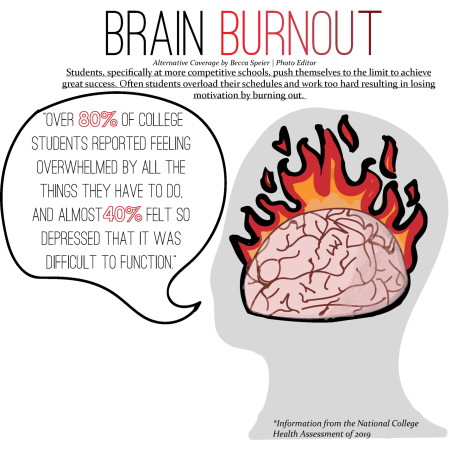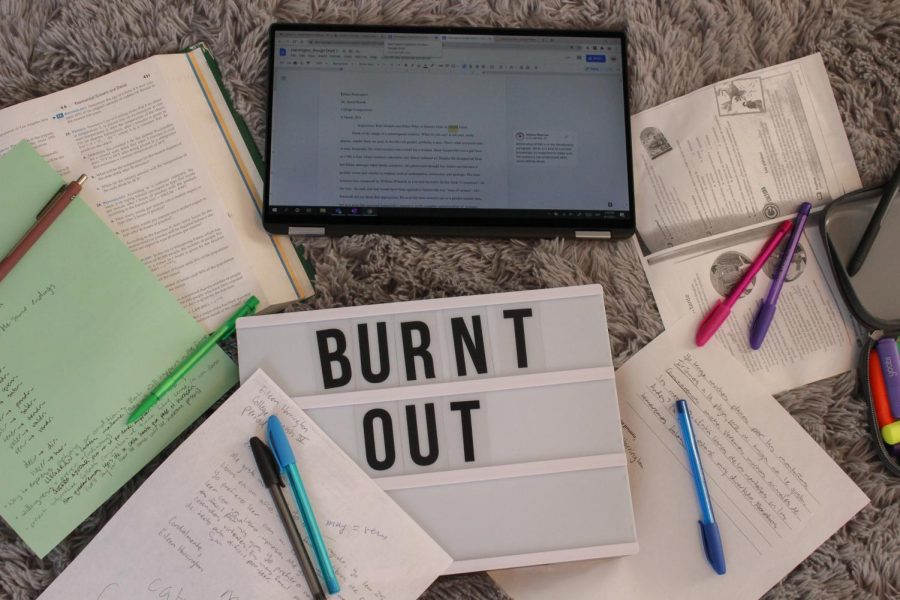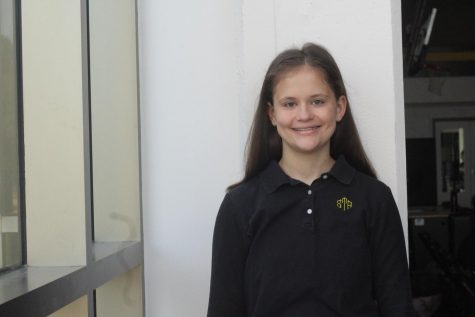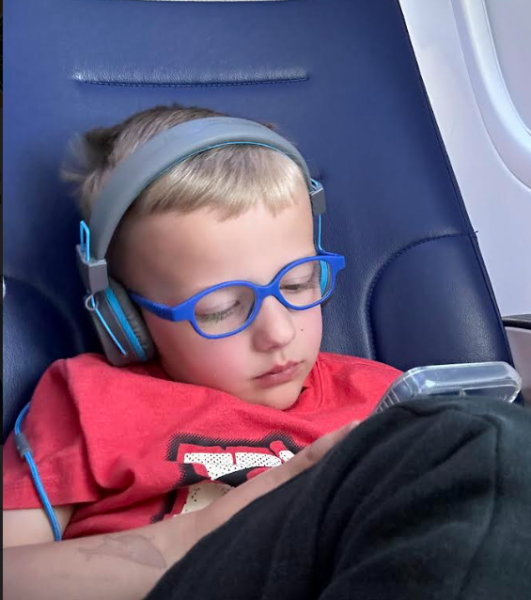The burnout burden
The search for high achievement combined with the COVID-19 pandemic has led to burnout for STA students.
A pile of homework materials sit around the words “burnt out” April 1. Student burnout is becoming a trend on social media platforms such as TikTok and Instagram. photo illustration by Sydney Allen
April 20, 2021
Every Sunday around 1 p.m., junior Rebecca Hoff hits a point where the reality of going back to school the next morning makes her feel stressed and depressed. She experiences burnout for a few days about twice a month, typically around the times she has important tests.
“I experience stress caused by academics daily,” Hoff said. “It varies from underlying anxiety from homework each day to full-blown panic when I have tests or projects due. I usually always feel a little bit stressed. (Which can be a good thing! Stress is supposedly supposed to help your performance abilities.) But around one to two times a week I get really stressed out.”
Senior Molly Hirner has also experienced academic burnout.
“I feel like I haven’t had burnout to the point where I’ve gotten super bad grades, but maybe more to the point where it’s like made me procrastinate a lot,” Hirner said. “Or also like, I’ve learned to live a lot more by ‘work smarter, not harder.’ I work pretty hard, but I feel like, especially this year with COVID-19, I just don’t really, and I’ve taken really hard classes, taken AP in mostly everything, so all that stress and workload has just kind of built onto senior year, and I’m just like, if I can do the least amount of homework at night. Like I try to get everything done at school, and then at night I just can’t do homework when I’m outside of school basically now.”
Counselor Amanda Whitcomb has her own definition of burnout.
“I would define burnout as a feeling of exhaustion and apathy when it comes to tasks that you previously felt very strong in completing or confident in completing, and you’re just no longer able to find the motivation or the desire to do those things,” Whitcomb said.
According to Whitcomb, there are many different types of burnout, such as from athletics, academics or relationships. Burnout in different areas can often be caused by one original problem, which then grows out of hand.
“Side effects are going to be different depending on what area of burnout you’re experiencing,” Whitcomb said. “If you’re struggling with burnout in school, likely your grades are going to dip. Sometimes it can be unfortunately a snowball effect. If you experience burnout in one area, other things are affected and then you experience burnout in other areas or other things start falling by the wayside.”
Whitcomb believes that burnout is common among high school students because many constantly pressure themselves to obtain high achievement.
“In my experience with young people and young girls in particular at St. Teresa’s, I think there is a strong desire to be the best or on top or do really well, sort of this perfectionist drive,” Whitcomb said. “Not for every person, but for students who are really academically inclined or maybe athletically inclined, to really achieve in all areas. And that’s a wonderful goal. I think sometimes we put so much pressure on ourselves that that academic and athletic and whatever performance ability, anything like that, can turn very quickly into something negative.”
According to Hoff, she believes that the college-prep environment at STA may make students more susceptible to burnout, saying that she sees two different groups of students at STA. In her opinion, one group is more susceptible to burnout.
“The academic environment of STA is definitely stressful, there are girls who stress with anything less than a 95% and girls who are happy with 80% and above,” Hoff said. “It’s difficult to take a step back and realize the most important part is that you’re learning and are going to be prepared for your future no matter what.”
Whitcomb has seen the amount of students struggling with burnout increase since the beginning of the COVID-19 pandemic. While she says that it is not uncommon in a normal year, the presence of burnout is especially amplified this academic year.
“When it comes to burnout with school, I would say this year more so than previous years, given what we’re dealing with in terms of the COVID-19 pandemic and social isolation, I would say even though we’re here at school and we’re engaged and we’re doing things, so many students are struggling with staying motivated to do their work,” Whitcomb said. “They know they have to do their work, they want to get it in, but it’s been really hard to finish work, even in-class work.”
Hoff has had a similar experience, as the combination of stress from AP classes has combined with the impacts of the COVID-19 pandemic to create amplified stress.
“I think I’m more stressed because it’s my junior year,” Hoff said. “I decided to take five AP/college credit classes, and it’s a lot of work. I don’t regret the workload, but I definitely wouldn’t recommend it. Because with COVID-19 guidelines (social distancing, masking and quarantining), I just feel more isolated than I did last year. I rarely see my friends outside of school and when I do, it takes a lot of time and planning to make everything COVID-19 safe. I’m really hopeful that once everyone has their vaccine, things can go back to normal and I can see my friends more often.”

When students struggling with burnout come to Whitcomb for counseling, especially during the COVID-19 pandemic, she focuses on helping that student develop strategies to deal with the stress. She also focuses on building connections with other people in the student’s life, particularly their teachers.
“I think helping students to create connections and relationships with their teachers [is important],” Whitcomb said. “To let them know, ‘Hey, I’m having a hard time, can I get an extension on this? I really need some extra help with this, could we find a time to meet?’ So helping them to advocate for themselves so that they can get what they need in the classroom.”
To cope with stress, Hoff tries to drink a lot of water, take a nap or talk to her family and friends. However, when she is especially stressed, she tries to just get the work done.
“Honestly, usually when I’m stressed with homework or a test, I just sit down and crank it out,” Hoff said. “I’ll spend hours and hours of just doing only homework until it’s all done. Which is probably unhealthy.”
Hirner has a different approach to dealing with stress, typically giving herself a break and returning to her work.
“I feel like, a lot of times if I’ll be up until super late at night studying or doing homework because I either just pushed it back, or I had so much, and I’m just so over it— I’ll just go to sleep and then pick it up in the morning and do the best I can,” Hirner said. “I reward myself. I’ll be like, okay, 20 minutes of homework now, and then you can go get a snack or something. Which doesn’t really help honestly because eventually I get out of that cycle, but I feel like also just setting goals.”
Overall, Hirner appreciates the unique environment at STA, calling it “supportive competitiveness.” While Hirner attended a different school sophomore year, she thinks the environment at STA is more conducive to preventing burnout and attributes the increase in burnout and stress primarily to COVID-19.
“The college-prep, going to another school, and my other school was also college-prep, and it was a lot more competitive with kids because it was 50% international kids, so it was a lot more toxic competitiveness where people would ask instantly, ‘what was your test grade,’ and they would get mad if you did better than them or set the curve,” Hirner said. “But I feel like here, everyone’s just more supportive, and it’s like, oh my god you set the curve, good job! Or with ACT scores, I remember everyone was super chill and supportive about it and it didn’t really matter. You can do the best you can.”









